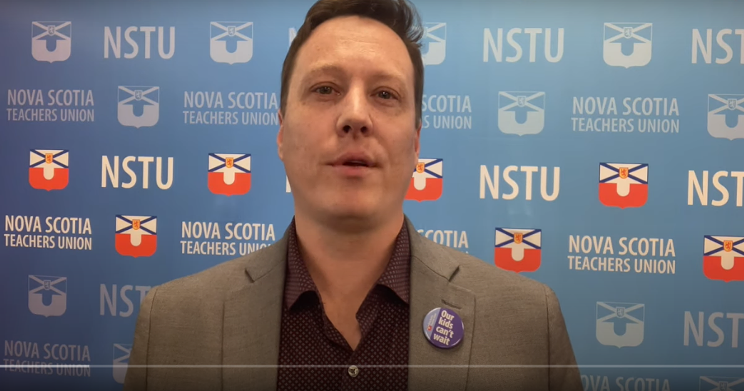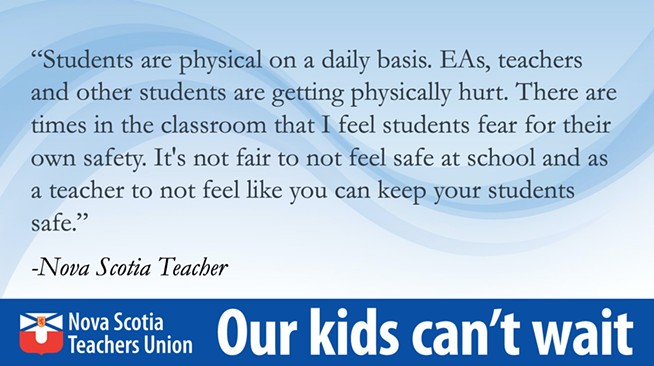There are roughly 10,000 teachers in Nova Scotia taking a vote on April 11 on whether or not to strike. The Nova Scotia Teachers Union is negotiating a new collective agreement with their employer—the minister of education and early childhood development—since their old agreement expired Aug. 1, 2023.
Bargaining teams for the NSTU and the Department of Education have met with a provincial conciliator to help improve negotiations after six months of bargaining. Union president Ryan Lutes says this strike vote will serve as a “wake-up call” to the province that teachers are struggling: They need their concerns negotiated into a fair contract, or they’re prepared to take action.
The union is made up of teachers, school counsellors, and school specialists including psychologists, speech language pathologists and social workers. NSTU agreements are typically four years long and determine things like teaching duties, wage increases, terms of pregnancy leaves, school closures and working conditions.
Lutes is both NSTU president and a member of the union’s bargaining team. Both sides have been at the table since last fall.
Lutes says they’re holding a strike vote during negotiations because “we’re not seeing the appetite from the government to have meaningful discussions about any of the issues that are affecting our schools.”
According to an NSTU survey from February, 84% of teachers have contemplated quitting in the last five years. “Most of them cite increasing violence, burnout or increased workload as reasons for that,” says Lutes, “and we're not getting any meaningful discussion on many of those issues at the bargaining table at this point.” Lutes writes in the NSTU publication The Teacher that the top six reasons teachers cited for considering quitting were 76% burnout, 66% high workload, 66% lack of resources to support students, 54% lack of employer support, 54% lack of respect from employer and/or the government and 42% rising levels of school violence.
Writes Lutes, “when teachers are burnt out and stressed, so are your students,” saying he’s “extremely concerned” about how many teachers will leave the profession.
Lutes writes that the NSTU has been “screaming from the rooftops” for a comprehensive teacher retention and recruitment strategy “for over a year, while the government continues to sit on its hands—meanwhile, our classrooms continue to grow increasingly chaotic and unsafe.”
Lutes writes the only way for the NSTU to force their employer to “take things seriously is to continue to collectively campaign for improved teaching and learning conditions in our schools.”
Lutes is confident the NSTU will vote “Yes” for a strike mandate on April 11, although he says a strike won’t happen immediately on April 12. The point is to get an agreement before then. The NSTU expects an agreement that is going to move them, their students and public education ahead.
In a statement to The Coast, Nova Scotia’s minister of education Becky Druhan writes that any talk of a potential strike “is concerning for students and families” and reassures Nova Scotians that both sides “continue to actively bargain,” with dates scheduled in April to return to conciliation.
Says Druhan, “I respect the bargaining process and strike votes are often part of that and within the right of the union. However, after the learning disruptions our students have experienced over the last five years, I do not believe they or their families are best served by a walkout or the threat of one.” She writes that “the complex issues our educators are dealing with” are unlikely to be solved by a strike.
Lutes says teacher shortages and working conditions are making job burnout rise and teacher retention fall, which has created a downward trend in the quality of public education. Another issue the NSTU wants addressed at the table is wage increases for substitute teachers.
“That's a consistent message that we hear outside of collective bargaining,” Lutes says. “A number of substitute teachers—a larger number than people realize—aren't working because they've had to find jobs elsewhere because of lack of appropriate pay.” Substitute teachers are integral to the teaching profession for many reasons, especially during teacher shortages.
“If you're a substitute teacher and you work every day of the school year that you can, you're making between $33,000 and $34,000 a year, which obviously doesn't cut it in this economic environment.” It means Nova Scotia and the NSTU can’t attract prospective teachers, which Lutes says should be a top priority.
“We have a long history of being able to come up with fair agreements with the government when there's an appetite to do that,” says Lutes. “We hope this strike will send the message–but it also sends a message that if the government doesn't change its attitude, then we are prepared to take that action.”
The NSTU has only gone on strike once in its 125 years—for a single day in 2017, when the province passed Bill 75 that required the NSTU to accept the province’s contract offer.
At the time, all liberal MLAs voted unanimously to pass Bill 75, which has since been ruled unconstitutional for side-stepping the bargaining process.
Lutes was involved with the NSTU’s last round of bargaining in 2018-19 with then-premier Stephen McNeil’s Liberal government, which he calls “an anti-union government.” Despite this, Lutes says the NSTU was “farther along with them than we are now,” in terms of getting a new agreement with Tim Houston’s Progressive Conservative government.
Lutes says that when the current PC government was in opposition to the Liberals, before Houston was elected premier in 2021, the Conservatives had promised to support teachers and public education.
“Tim Houston is a self-proclaimed solutionist,” says Lutes, but says solutions are not what teachers are seeing now at the bargaining table.
Writes minister Druhan in a statement to The Coast, “I am hopeful that we can come to a negotiated employment agreement with the 14 people at the bargaining table,” and that she believes improving conditions for teachers is done through “the path that I started on when I took office—working directly with teachers, support staff, administrators and regions across the province to act on their knowledge of their classrooms.”
Druhan calls her direct engagement with teachers “unprecedented,” which Lutes says is true. “What is not true is that there's been unprecedented action based on what she's hearing from teachers,” he says.
Lutes calls the lack of government action based on what the minister is hearing, “the missing link.”
“That's what members are frustrated with; that's what the NSTU is frustrated with at the bargaining table. Teachers are feeling that frustration.”
Lutes says that, while there are 14 people at the bargaining table for each side, “I think we're going to find out on [April 11] that behind the NSTU bargaining team are 10,000 teachers who expect this government to treat them fairly and to advance the cause of public education.
“We're conveying grassroots teachers' concerns, and the government is dismissing them.”
Watch Lutes' video for NSTU's strike vote here:













